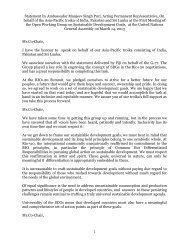STATE OF THE WORLD'S CITIES 2012/2013 Prosperity
STATE OF THE WORLD'S CITIES 2012/2013 Prosperity
STATE OF THE WORLD'S CITIES 2012/2013 Prosperity
You also want an ePaper? Increase the reach of your titles
YUMPU automatically turns print PDFs into web optimized ePapers that Google loves.
participation and erodes the relationships between the<br />
citizenry and the level of government closest to them. 7<br />
Box 3.1 highlights how decentralization can play a key<br />
role in the prosperity of cities.<br />
While the responsibilities of municipal governments<br />
have increased following reforms in recent years, many have<br />
no access to the financial resources needed to undertake<br />
these functions. This naturally creates a mismatch between<br />
responsibilities and financial resources, and is a major<br />
reason why decentralization has been less than successful in<br />
certain countries.<br />
National reforms relating to various aspects of<br />
decentralization – revenue allocation, community<br />
participation, local elections, local planning, pro-urban<br />
development strategies – all provide the enabling<br />
environment for cities to prosper.<br />
Box 3.1.1<br />
Decentralization and the prosperity of cities<br />
A major benefit of decentralization as it relates to the prosperity<br />
of cities is that delivery of essential services such as water,<br />
sanitation and waste management, health and education can<br />
be carried out more effectively. Decentralization can make<br />
for better service delivery by providing greater opportunities<br />
for community-based groups to lobby for improved services.<br />
Proximity to physical demand for a service encourages<br />
effectiveness and promotes a more rational use of resources,<br />
while also allowing for closer monitoring by the beneficiary<br />
population of projects intended to serve them.<br />
The devolution of authority can foster community<br />
participation, too. Decentralization can lead to an institutional<br />
framework through which various political, religious, social,<br />
ethnic groups and multi-levels including towns and cities, can<br />
participate in making decisions that will affect them.<br />
Decentralized decision-making can provide a better<br />
framework for poverty reduction, so long as it is accompanied<br />
by fiscal devolution of powers to municipal authorities.<br />
Decentralization can accelerate economic development through<br />
active engagement of regional and municipal government<br />
units and local enterprises in economic activities. The transfer<br />
of authority and resources to local units of government and<br />
administration to design and implement programmes provides<br />
more opportunities for local citizens to play a more direct role<br />
in the development process. As catalysts for development and<br />
local change agents, they can make decisions about location of<br />
services and determine priorities.<br />
Source: UN-Habitat (<strong>2012</strong>) Decentralization in Iraq: Challenges and<br />
Solutions for Federal and Local Governments, Nairobi: UN-Habitat<br />
95<br />
POLICy<br />
System that creates<br />
equal opportunities<br />
The importance of this<br />
factor is most pronounced<br />
in Arabs States compared<br />
with other regions. This<br />
is because Arab States<br />
are one of the most<br />
egalitarian in terms of<br />
income distribution in the<br />
developing world. This is<br />
reflected in an overall (low)<br />
Gini coefficient of 0.36,<br />
which has been declining<br />
over time. 9 The low degree<br />
of inequality in the region<br />
has been attributed to a<br />
From Comparative Advantage to Urban <strong>Prosperity</strong><br />
For decentralization to strengthen urban authorities’<br />
commitment to urban prosperity, it must be backed by<br />
fiscal devolution.<br />
strong, cohesive social system, and the fact that redistribution<br />
constitutes a policy priority in Islamic economies. 10<br />
A system that creates equal opportunities for all can<br />
use redistributive policies that give priority to low-income<br />
groups and areas. In Venezuela, the government has used<br />
redistributive policies to bring significant improvements<br />
to the living standards of the urban poor through<br />
massive investment in health and education. 11 With the<br />
provision of over 8,000 clinics in the barrios, people are<br />
able to access health services 24 hours a day at no cost.<br />
Similarly, illiteracy has been eliminated, pupils are no<br />
longer restricted to elementary school, and those with the<br />
required academic qualifications can attend university.<br />
Another form of redistribution policy involves<br />
conditional cash transfers. These enhance the human<br />
capital of beneficiaries through transfers which are made<br />
POLICy<br />
POLICy Decentralization<br />
works well<br />
when backed by strong<br />
commitment and support<br />
from central government. 8<br />
FACT<br />
A system that<br />
guarantees equal<br />
opportunities for all is<br />
the third important factor<br />
underlying the prosperity of<br />
cities. The more egalitarian<br />
a city, the more prosperous<br />
it becomes.<br />
For a city to be truly prosperous, it must deploy<br />
systems that will ensure equal opportunities for all,<br />
especially the more vulnerable – the poor, women, children, the<br />
elderly, youth and the disabled. A prosperous city is one where the<br />
aspirations of all segments of the population are realized. Highly<br />
unequal cities are a ticking time bomb waiting to explode.



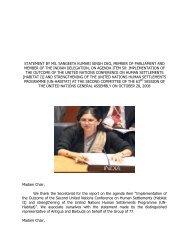
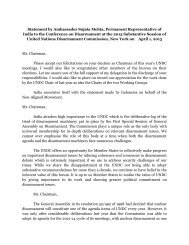
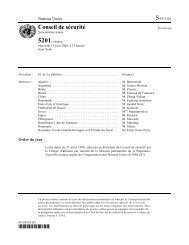
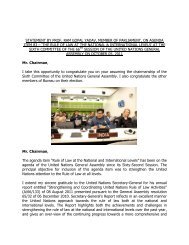
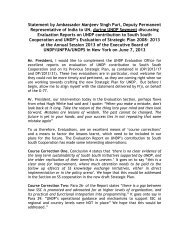




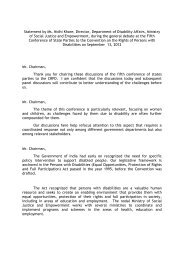
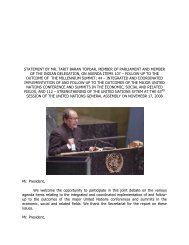
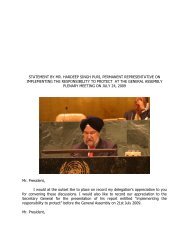
![1 statement by dr.[mrs] kakoli ghosh dastidar - Member States Portal](https://img.yumpu.com/27526598/1/190x245/1-statement-by-drmrs-kakoli-ghosh-dastidar-member-states-portal.jpg?quality=85)
